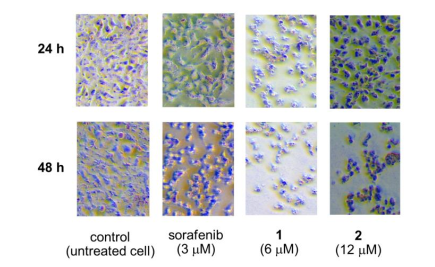Xanthones from Garcinia mangostana inhibit the proliferation and migration of hepatocellular carcinoma cells
Keywords:
xanthone, Garcinia mangostana, cell proliferatin, cell migrationAbstract
Hepatocellular carcinoma (HCC) accounts for more than 90% of liver cancer cases worldwide and is the most common cancer in men in Thailand. Here, we investigated the effect of five xanthones isolated from Garcinia mangostana root on the proliferation and migration of human HCC cell lines. We identified five xanthones, among which the prenylated xanthones 1–3 had significant anti-proliferative effects on both Hep-G2 and Huh-7 cell lines, with 50% inhibitor concentrations (IC50) ranging from 5.9 μM to 15.0 µM. In contrast, the simple xanthones 4 and 5 were inactive (IC50 >50 µM), implying that the prenyl moiety is required for the inhibitory activity. Exposure of HCC cells to 1 and 2 (α- and β-mangostin) also suppressed cell migration, a crucial step in metastasis.
Downloads
References
Yeesoonsang S, McNeil E, Virani S, et al. Trends in Incidence of Two Major Subtypes of Liver and Bile Duct Cancer: Hepatocellular Carcinoma and Cholangiocarcinoma in Songkhla, Southern Thailand, 1989-2030. Journal of Cancer Epidemiology. https://doi.org/10.1155/2018/8267059
Jiang Y, Han Q-J, Zhang J. Hepatocellular carcinoma: Mechanisms of progression and immunotherapy. World J Gastroenterol. 2019;25(25):3151-3167. https://doi.org/10.3748/wjg.v25.i25.3151
Llovet JM, Zucman-Rossi J, Pikarsky E, et al. Hepatocellular carcinoma. Nat Rev Dis Primer. 2016;2:16018. https://doi.org/10.1038/nrdp.2016.18
Yamaguchi H, Wyckoff J, Condeelis J. Cell migration in tumors. Curr Opin Cell Biol. 2005;17(5):559-564. https://doi.org/10.1016/j.ceb.2005.08.002
Carmeliet P. Angiogenesis in health and disease. Nat Med. 2003;9(6):653-660. https://doi.org/10.1038/nm0603-653
Wang M-H, Zhang K-J, Gu Q-L, Bi X-L, Wang J-X. Pharmacology of mangostins and their derivatives: A comprehensive review. Chin J Nat Med. 2017;15(2):81-93. https://doi.org/10.1016/S1875-5364(17)30024-9
Liao Z, Wang X, Wang X, Li L, Lin D. DEPDC7 inhibits cell proliferation, migration and invasion in hepatoma cells. Oncol Lett. 2017;14(6):7332-7338. https://doi.org/10.3892/ol.2017.7128
Phitaktim S, Chomnawang M, Sirichaiwetchakoon K, Dunkhunthod B, Hobbs G, Eumkeb G. Synergism and the mechanism of action of the combination of α-mangostin isolated from Garcinia mangostana L. and oxacillin against an oxacillin-resistant Staphylococcus saprophyticus. BMC Microbiol. 2016;16(1):195. https://doi.org/10.1186/s12866-016-0814-4
Ee GCL, Izzaddin SA, Rahmani M, Sukari MA, Lee HL. γ-Mangostin and Rubraxanthone, Two Potential Lead Compounds for Anti-cancer Activity against CEM-SS Cell Line. Nat Prod Sci. 2006;12(3):138-143.
Xu Z, Huang L, Chen X-H, et al. Cytotoxic prenylated xanthones from the pericarps of Garcinia mangostana. Mol Basel Switz. 2014;19(2):1820-1827. https://doi.org/10.3390/molecules19021820
Li W, Chan C, Leung H, Yeung H, Xiao P. Xanthones and Flavonoids of Polygala caudata. Pharm Pharmacol Commun. 1998;4(8):415-417. https://doi.org/10.1111/j.2042-7158.1998.tb00722.x
Wang JP, Ho TF, Lin CN, Teng CM. Effect of norathyriol, isolated from Tripterospermum lanceolatum, on A23187-induced pleurisy and analgesia in mice. Naunyn Schmiedebergs Arch Pharmacol. 1994;350(1):90-95. https://doi.org/10.1007/BF00180016
Sporn MB. The war on cancer. Lancet Lond Engl. 1996;347(9012):1377-1381. https://doi.org/10.1016/s0140-6736(96)91015-6

Downloads
Published
How to Cite
Issue
Section
License
Copyright and Disclaimer
Articles published in this journal are the copyright of Chulabhorn Royal Academy.
The opinions expressed in each article are those of the individual authors and do not necessarily reflect the views of Chulabhorn Royal Academy or any other faculty members of the Academy. The authors are fully responsible for all content in their respective articles. In the event of any errors or inaccuracies, the responsibility lies solely with the individual authors.


